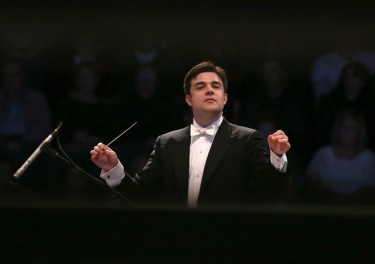By Janie Magruder
GCU News Bureau
George Frideric Handel’s “Messiah” has a way of uniting people, on the risers and in the seats.
The 18th-century masterpiece is so accessible that teenagers with little musical training can learn to sing it confidently, especially when bolstered by those who could perform the score with one vocal cord tied behind their back.
We’ll see both onstage during Grand Canyon University’s third annual performance of “Handel’s Messiah,” at 7 p.m. on Thursday in the Arena. Tickets are $25 and $12.50 ($7.50 for groups of 10 or more) and available at www.gcuarena.com.
Presented by GCU’s College of Fine Arts and Production and its Music Department, “Handel’s Messiah” will be performed by the Phoenix Symphony with GCU’s Choral Society and Festival Chorus. Michael Christie, the symphony’s music director laureate, will conduct for the second consecutive year.
“It’s a rare opportunity for young artists to sing with this caliber of orchestra,” said Philip Carr, a voice teacher at the University who, with Assistant Dean Juan Hernandez, has been readying the chorus. “The Phoenix Symphony is top of the rock.”
About 45 symphony instrumentalists and 300 vocalists from 11 area high schools and numerous church and community choirs, in addition to GCU’s Canyon Singers, New Life Singers and Canyon Chorale, will perform. The concert also will feature GCU faculty members as soloists.
“This magnificent work is one of those rare masterpieces that has been continuously performed since its premiere in 1741,” Hernandez said. “A favorite of audiences, this work in three parts takes passages from the Scriptures to reflect on the birth, death and resurrection of Christ.”
A few GCU faculty and staff have joined the chorus, too, including Anna Faith Smith, assistant dean of the College of Theology, who has been singing “Messiah” at GCU since she was a student here in the late ‘70s. To Smith, an alto, the work is as moving today as when she first learned it.
“To see these Messianic prophecies from Isaiah and then to know that Handel, who was somewhat of a secular guy, thought it was so important to tell that story in a way that was musically moving … it was a masterful job,” she said.
Once you’ve sung “Messiah,” you’ll never forget it, said MaryBeth Nipp, a GCU English professor who each Christmas looks for a local chorus to join.
“It’s truly a God-inspired piece,” the alto said. “I love the story of how Handel really experienced the presence of God as he was writing it and how it came together in a very short time.”
Twenty-four days, in fact. After receiving the Scriptural text from Charles Jennens, a friend and collaborator, Handel outlined the music for Part I (covering the prophecies of Isaiah and others and Jesus’ miracles) in seven days. Part II (Jesus’ crucifixion and resurrection and the spreading of the Gospel) came together in nine days, and Part III (Paul’s teaching of the resurrection of the dead and Christ’s glorification in heaven) was completed six days later, capped by two days of final editing.
Handel wrote the piece for modest vocal and instrumental forces, and it was not adapted for performances by grand orchestras and choirs until after his death.
“I think he’d be pleased to know that his music has been embraced by so many and that it has become such a familiar expression of art and faith,” Carr said. “There is much that we don’t know about Handel’s faith walk, but I don’t know how you could create a work of this magnitude without a higher level of inspiration.”
Contact Janie Magruder at 639.8018 or [email protected].




































































